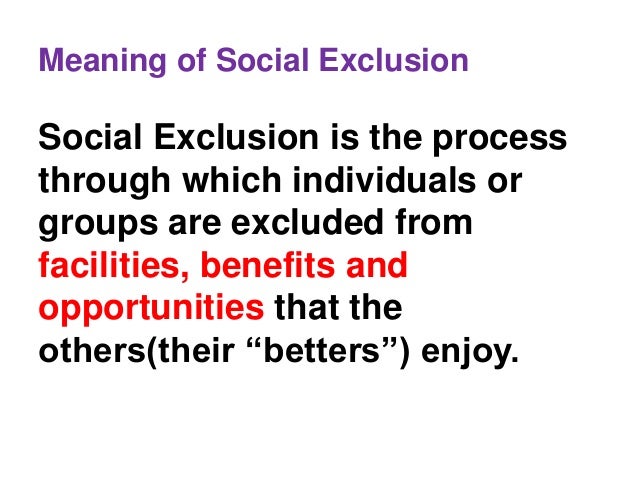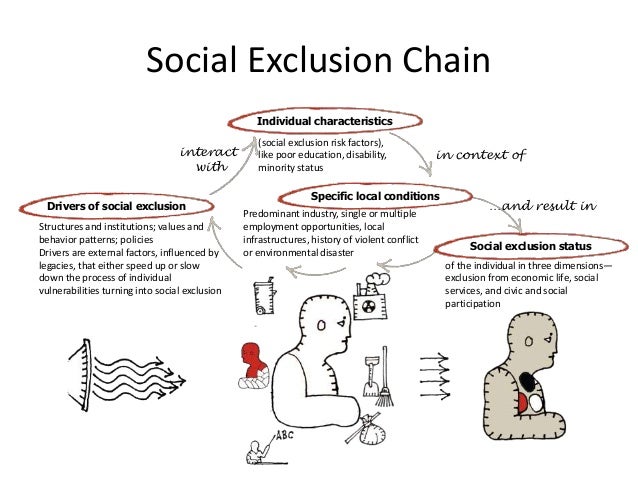Relevance: Sociology: Paper I: Social Stratification

What is Social Exclusion?
- Social exclusion refers to “A process by which individuals or households experience deprivation, either of resources such as income or of social links to the wider community or society”. “Social exclusion refers to the ways in which individuals may become cut off from full involvement in the wider community.”
- In order to live full and active life individuals must not only be able to feed, clothe and house themselves but should also have access to essential goods and services such as education, health, transportation, insurance, social security, banking and even access to the police or judiciary.
Nature of Social Exclusion:
- Social exclusion is systematic –it is result of structural features of society. Exclusion is practiced regardless of the wishes of those who are excluded.
For example rich people are never found sleeping on the pavements or under bridges like thousands of homeless poor people in cities and towns. This does not mean that the rich are being excluded from access to pavements and park benches because they could certainly gain access if they wanted to but they choose not to.
Social exclusion is sometimes wrongly justified by the same logic –it is said that the excluded group itself does not wish to participate. The truth of such an argument is not obvious when exclusion is preventing access to something desirable.
For example upper caste Hindu communities have often denied entry into temples for the lower castes and specially the dalits. After decades of such treatment the Dalits started building their own temple or convert to another religion like Buddhism, Christianity or Islam. After they do this they may no longer desire to be included in the Hindu temple or religious events. But this does not mean that social exclusion is not being practiced.

How Social Exclusion Indicates Deprivation of Opportunities?
Social Exclusion Indicates Deprivation of Opportunities: The concept focuses attention on a broad range of factors that prevent individuals or groups from having opportunities open to majority of the population.
It indicates that some are denied of having access to essential goods and services such as education, health, transportation, insurance, social security, banking and even access to the police or judiciary.
It is not enough if individuals are just provided with food, clothing and shelter. A fuller and an active involvement in life demands greater freedom and better access to all the essentials of civilized life on par with all the others in the society.
- Social Exclusion is Not Accidental : Social exclusion in most of the cases is found to be an inbuilt mechanism to deprive a few of their social rights. It is the result of the structural features of society. The ‘untouchables’ in India, were excluded from doing many things, for example, entering temples, sharing food along with higher caste people, drawing water from public wells, receiving education on par with others, etc as a matter of caste rule.
- Social Exclusion is Involuntary : Social exclusion is practiced regardless of the wishes of those who are excluded. In the case of the untouchables of India, for example, it is trusted upon them. They are prevented from having access to something desirable, say for example, having access to education, or entering religious institutions, etc.
Why Prolonged Exclusion Leading to a Reaction Against Inclusion?
Prolonged experience of discrimination and insult underwent by an excluded group often compels it to develop a reaction against inclusion. As a result, it may stop making attempts for inclusion.
For example, the denial of temple entry for the dalits in India for decades together by the upper castes may ultimately compel the dalits to build their own temple, or to convert to another religion like Buddhism, Christianity, or Islam. When once they start doing it, they may no longer desire to be included in the Hindu temple or religious events. However, it cannot be concluded that all the excluded would think and act on the same line. Instances of this kind point out that social exclusion occurs regardless of the wishes of the excluded.
- ‘Homelessnessis one of the worst forms of social exclusions’, according to Anthony Giddens as it automatically excludes an individual from various other social services. Social exclusion leads to other abnormal behaviours also.
- Social Exclusion in Relation to Social Rights : This usage refers to the context in which people are prevented from exercising their rights due to certain barriers or processes.
- Social Exclusion in Relation to Social Isolation : This usage throws light on the context in which some people or some section of the population is kept away or distanced from others in most of the social dealings. Example: Practices of social discrimination and exclusion during the British rule in South Africa which led to the social isolation of the natives.
- Social Exclusion in Relation to Marginalisation : This usage refers to the social exclusion of the extreme kind in which some “are denied of opportunities and avenues under the pretext of educational credentials, party membership, skin colour, religious identity, proper manners and style of life, social origins, etc.

- Exclusion is not Always Deprivation and Inclusion is not Always Justice : It is a common practice to equate exclusion with inequality, deprivation, unfairness and injustice; and inclusion with equality, fairness and justice. In our practical life this is not necessarily so. There are situations in which even inclusion would lead to painful experiences. For example, successfully fighting against exclusions and discriminations, some women members maybe recruited as employees to a men-dominated company. After getting included or recruited also these women may find it highly embarrassing to work in the company which is dominated by men who are not that co-operative.
For more such notes, Articles, News & Views Join our Telegram Channel.
Click the link below to see the details about the UPSC –Civils courses offered by Triumph IAS. https://triumphias.com/pages-all-courses.php

